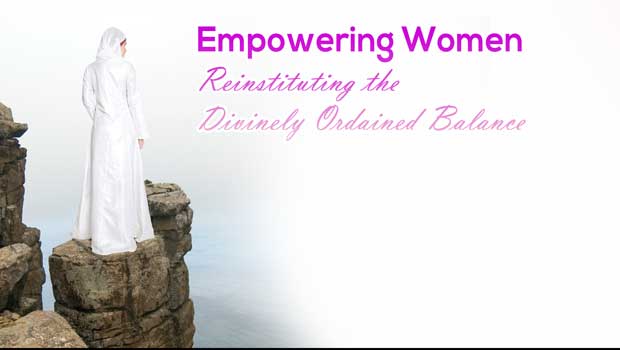Most people dream of a world where everyone is afforded dignity and worth, safety and security, aspiration and opportunity for accomplishment. Smack in the center of this challenge is the relation between those with authority and those who follow and obey that authority. Most human authority, historically, has deemed itself privileged, preferred, and entitled. That has endlessly resulted in harm and denial of rights for countless human beings. Muhammad, peace be upon him, however, delivered to humanity a model of leadership based on serving, of being a servant — first to God and then to other people and the rest of the created world. In this model, there is no basis for an unquestioned supremacy of leaders, be it in business, government, or family.
If our leaders do not have genuine spirit of service in their hearts, then we end up with corruption and widespread injustices and misery. Umar (RAA) is reported to have said to the people, “I have appointed over you governors and agents, not to beat your bodies or take your monies, but rather to teach you and serve you.” Those who understand the infrastructure of authority and obedience serving a greater good, will teach and serve. Those who imperil their own souls with unbridled ambition, serve themselves and cavalierly turn a blind eye to maltreatment of others and denial of their rights, and even the means of survival beyond subsistence. Those who serve themselves care only about reaching their own greatest potential in the accrual of power, prestige, and wealth, even while denying to others the opportunities to progress and thrive.
Authority and Obedience are Functional and Contractual
Leadership in Islam is intended to serve the needs of the people and support the greater good. It also is meant to unlock the greatest potential in all human beings, both of the leader and those who follow that leadership. That only takes place when the leader understands the limits and qualifications placed upon his authority/power and is devoted to the objectives of leadership according to Islamic teachings. With awareness that leadership in Islam ordains that both authority and obedience subscribe to the same system of belief, the same objectives and goals whose primacy is spiritual rather than material, the same adaab, selfsame surrender to the Lord, and to the same criteria of the permissible and the forbidden, much of the danger attached to the wielding of power is dismantled. Common wisdom is that power corrupts and absolute power corrupts absolutely, wherein a leader takes on attributes of arrogance and overweening pride as if he were destined to rule over other people. Islam, however, makes it crystal clear that authority and obedience are contractual, an agreement between two or more aiming for a common purpose; the root meaning of “contract,” in English, is “to draw in, to bring together.” This contrasts with the leader having power over and against those within the domain of his authority.
Yet, the European concept of the divine right of kings which held sway through the middle ages, asserted that the leader is legitimized and given the right to rule according to the direct will of God, without being conditional upon anything else. Islamically, the leader’s authority is conditional upon obedience to Allah SWT and His messenger and obligated to standards of bil ma’ruf —in accordance with shari’ah and all that is good (discussed in more detail below). Leadership in Islam is a trust. The leader has been entrusted to guide and to serve those who follow him. And when a leader breaches that trust, whether by error or malfeasance, he is to be corrected. When Abu Bakr (RAA)was chosen as khalif, he made the following pronouncement to the people: “O people, I am appointed as your ruler. I am not the best among you. If I do good, help me; if I do wrong, straighten me. Truth is honesty and falsehood is treason. The weak among you is strong until I restore his right for him; and the strong among you is weak until I take the other’s rights from him, insha’Allah. Obey me as long as I obey Allah and His messenger. If I disobey them, you don’t owe me any obedience…” This is supported fully by the hadith, “There is no obedience to any created being in disobeying the Creator” (Ahmad).
Imagine if every husband announced to his wife upon marriage, “O dear wife, I have been appointed by Allah SWT as the ameer of the family. This does not mean that I am better than you. If I do good, help me; if I do wrong, straighten me. Truth is honesty and falsehood is treason. I will restore the rights of any family member who is rendered weak by circumstance; and I will ensure that my position of strength in the family never takes your or the children’s rights away, insha’Allah. Obey me as long as I obey Allah and His messenger. If I disobey them, you don’t owe me any obedience…”
Illustrating this in a practical way within the family is a story about a couple who went for Islamic counseling because they had differing views about how to discipline their children. The father was very authoritarian, believing that the children were obligated to respect and obey him unconditionally. He was extremely strict and when he perceived any instance of disrespect or noncompliance with the rules he had established for the children, he would lose his temper and grab for anything handy to hit the children with. When the mother would try to intervene and stop him from hitting one of their children, he would scream at her that she had no right to stop him and that her actions were undermining his authority. In a counseling session, the counselor asked the man to describe what his wife said and did when she intervened. The man admitted that she very calmly would put her hand on his shoulder and say something like, “Why don’t we sit down and talk about this situation and see if we can find some solution we can all learn something from.” The counselor asked if she had a disrespectful tone or attitude. The man said that she did not. The counselor also asked if he and his wife had discussed the matter of discipline privately, when the children were not around, in order to come to some agreement. They had spoken about it many times, according to the husband, but had found no common ground.
The counselor pointed out that the intervening by the man’s wife falls under the category of enjoining the right and forbidding the wrong, as the father was acting out of anger and his harshness would harm the child. His temper also taught the child indirectly that the indulging of impulse and anger is acceptable, rather than teaching the virtues of self-restraint, tolerance, and patience. She also was following the Quranic principle that we should “remind” our believing brothers and sisters about the teachings of Islam, because “reminding benefits believers.” The counselor also pointed out the hadith about helping your brother whether he is the oppressed or the oppressor, and that the way to help the oppressor is to stop his oppression. This was an entirely new way to look at the dynamic and the husband began to gain a broader awareness and deeper understanding of the issue of disciplining the children and of his wife’s efforts to calm the situation down when he got over-reactive.
In fact, the man whose intention is to please Allah SWT seeks to reach his greatest potential in perfecting character. And this is only achieved if he desires and facilitates his wife and his children reaching their greatest potentials as well. Their strength of character is a great motivator and mirror for him, as his strength of character is for them. And while there is something of hierarchy advocated by Islam for every group — a group traveling or studying together, a communal group such as family or clan, a body politic such as a nation — in that they should select an ameer, there is also a built-in egalitarian check and balance. If the leader does good, the others in the group are to assist and obey; and if he does wrong, they are to do what needs to be done to set things right.
Those who lead based on an understanding of leadership as some kind of power and privilege over others, unqualified and absolute, are hard put to justify their position when confronted with the exemplary leadership of the Prophet (pbuh) and the companions. There is a story about Umar (RAA) when he was khalif that further illustrates the real-life application of these principles of Islamic leadership. It is both serious and humorous. He was walking through the streets of Madinah one evening, making sure that all was peaceful and secure in the city under his rule. He heard sounds of some sort of depravity coming from a house. He became incensed and knocked on the door. No one answered, so he climbed upon on the wall of the courtyard and yelled down to the man in the inner courtyard, “Why are you breaking the law and allowing such behavior in your house?” The man replied, “No man has the right to speak to another in that manner. Maybe I have committed a wrong, but think how many wrongs you have committed — spying, despite Allah’s command, ‘you shall not spy’; breaking and entering by climbing over the courtyard wall despite the command of Allah to ‘enter a house by the door’; entering without the owner’s permission in defiance of Allah’s command to ‘enter no house without the owner’s permission’; and omitting the salaam, though Allah has commanded ‘enter no house without indicating that you are a friend and greeting with peace those within.’” Umar (RAA) withdrew in remorse saying, “I forgive you your wrong.” The man responded, “That is your fifth wrong; how can you say that you forgive what Allah has condemned as a wrong?”
Authority is Qualified by Bil Ma’ruf
The reason that authority is given the fullest respect and is owed obedience in Islam is because it commits itself to upholding the law first and foremost as applied to itself and is willing to be corrected if it errs. Umar said, “May Allah bless the one who brings me my shortcomings as a gift.” The bottom line is that obeying those in authority is provisional on their adhering to the commandments of Allah SWT and the sunnah of the Prophet (pbuh), including speaking and acting according to bil ma’ruf. A verse in the Quran relates the incident of a group of women who came to the Prophet, peace be upon him, to pledge their loyalty to him. They were asked to obey the Prophet (pbuh) as long as what he commanded was bil ma’ruf: “O Prophet! When believing women come to you to take the oath of fealty to you, that they will not associate in worship any other thing whatever with Allah, that they will not steal, that they will not commit adultery, that they will not kill their children, that they will not utter slander, intentionally forging falsehood, and that they will not disobey you in any matter which is bil ma’ruf, then do receive their fealty, and pray to Allah for their forgiveness; for Allah is Oft-Forgiving, Most Merciful” (Quran, 60:12).
In the phrase “enjoin the right and forbid the wrong,” the word translated as “right” is ma’ruf. This Arabic word is very comprehensive. As already mentioned, ma’ruf is that which is in accordance with sharia and all that is good. That includes justice, fairness, respect, equity, caring, compassion, considerateness, kind regard, and what is Islamically customary. Now we know that the Prophet would never command that which was not bil ma’ruf. Yet Allah SWT qualifies obedience to the Prophet with this condition. Therefore, we can understand that obedience to any human being is contractual and functional, conditional on their leadership and command conforming to bil ma’ruf. Demonstrating disrespect or unfairness, or lack of compassion, considerateness, or kindness would be a betrayal of the condition of bil ma’ruf. Addressing husbands, the Quran says, “…Live with them on a footing of bil-mar’uf” (Quran, 4:19).
Some men, as husbands, stray outside the bounds of bil-mar’uf and use their authority as head of the family to coerce or subjugate. The Prophet (pbuh), in Imam Anasaa’e and Al-Mustadrak of Imam Al-Haqim, is reported to have said, “I emphatically warn about [transgressing against] the rights of two groups that appear to be weak – orphans and women.” Insight as to why this warning is necessary is found in the Arabic language. The word “kabeer” in Arabic means big and the “big guy” in the house in comparison to the wife and children is the husband and father. The root of “kabeer” is “kibr” which means arrogance; and a derivative of the root is “kabt,” which means suppression. So, men are warned — and take note of the words of the Prophet: “I emphatically warn” — not to transgress against women.
Reinstituting the Divinely Ordained Balance
Some might think that discussion of this sort leads to a disempowering of men by a commensurate empowering of women. And they worry that empowering women might lead to female arrogance or rebellion or neglect of the primary duty of women to bear and raise children who enjoin the right and forbid the wrong, children who place their most precious values in the domain of the spiritual rather than the material, who establish prayer, who are sincere lovers of truth and persevere against all odds to worship Allah SWT and to make peace in the world. Muslim women know this is their primary responsibility — raising this caliber of children.
And some caution that a social and political space that is inclusive of women will lead to fitna and, again, to dereliction of childbearing and childrearing. With regard to fitna, we only need to look at Islamic history in Makkah and Madinah to see the full involvement of women and the positive contribution they made to the early success of the Islamic mission. It is a fact that women today, with all the conveniences of the modern world, are able to raise children and also pursue education, career, or voluntary service, if they are so inclined. Those who argue that other activities impinge upon household endeavors need to consider that children grow up and a woman (the mother) has then another ten or twenty or thirty years to engage in productive activities beyond childrearing, utilize her gifts and develop her skills, and to contribute to the welfare of society. Furthermore, studies also show that a full ten percent of couples are unable to conceive. The population of the world today is almost 8 billion. Approximately half are women. Of those 4 billion women, 10 percent will be in marriages that are childless. That is 400 million women. That is a lot of human energy, talent, resource, and potential for contribution to the good of humanity.
To ensure that the leadership of the man within the family or society stays within divinely ordained bounds does not impinge on the honor, dignity, and empowerment of men. And neither does the empowerment of women impinge on men. It also does not impinge on the honor of men to note that women by nature are the ones predisposed to cooperation, submission, inclination to peaceful relations rather than confrontation and/or conflict, to be cautious about asserting themselves beyond established boundaries. The predisposition of men, given the biological prompting of testosterone, are more inclined to competition, desire for dominance, willingness to engage in physical confrontation, willing to push boundaries and claim new territories. This, of course, is part of the divine design, ensuring that these predominantly male traits will serve humanity’s will to survive, build, invent, progress, and thrive.
But does not the standing up for justice and enjoining the right and forbidding the wrong require both male and female dispositions— both male courage and assertiveness and female compassion and devotion to human well-being? Does not the progress and prosperity of human society require empowerment of both men and women? Can children be raised to be strong in character if their first teachers and most influential mentors are debilitated female individuals? Studies show that one’s personality and basic attributes are already formed by age three to five. Empowered women raise empowered children.
We can find ample indications of honoring and worthiness of the female gender in the divine scheme of things. The emotional predisposition of women has within its scope female intuition, compassion, and the general inclination to nurture. These attributes should be seen as noble and esteemed. But the emotional predisposition of women has often been presented as a liability, described in terms of instability, incapacity, hysteria — generally, inferiority. It is true that the intellect has been raised high in honor by the teachings of Islam. And the logical predisposition of men as a gender has been rendered by scholars and writers as noble and esteemed. Yet, according to the Prophet (pbuh), the highest level of the intellect, after eman, is to be of service to the creation. To which gender does serving others come more naturally? It is within the scope of the female inclination to nurture and to feel compassion toward others. The highest level of the intellect after eman, according to the Prophet, is not rationalism, logic, or deductive reasoning. It is the serving of others. And that is predispositionally a female trait.
Another example is the way the companions of the prophet understood the purpose of acquiring knowledge – that the primary purpose was to become more caring, and merciful toward others. So, the intellect, and its capacity and propensity to acquire knowledge, traditionally seen as a male domain, have ends and objectives which are more distinctly feminine and emotionally based (i.e., serving others, caring, and being merciful). Further, the Prophet said, “Knowledge is a tool to facilitate obedience. Look to whose authority you take it [knowledge]” (Muslim). Obedience to Allah SWT is a fundamentally noble action. Obedience is conjoined to the ultimate challenge of surrendering wholly to Allah SWT. Here again, obedience and surrender are integral to the natural disposition of women, more-so than to the disposition of man. Obedience and surrender are acquired by man through knowledge of deen, refinement of the character, and training.
The best example, however, that points to the honor that Allah SWT has bestowed on women as a gender has to do with mercy. We know that the foremost attribute of Allah SWT is rahmah. He is the Benevolent, The Merciful. And we know from hadith Qudsi that His mercy prevails over His wrath. Which gender, by nature, is the more merciful, compassionate one?
The Most Elegant and Stable Balance
The only intention in making these points is to underscore that Allah SWT has honored women just as He has honored men. Imagine if after citing these indications of female honor and dignity we then went further and declared that women are superior to men. We would have tipped the scale and instituted imbalance, with an egotistic desire pushing heavily on one side of the scale. But the most elegant and stable balance has been divinely ordained and must be observed, for it is God Who “understands the finest mysteries and is well-acquainted [with them] (Quran, 33:34). The beautiful balance has two necessary supports, the two integral parts of a complementary pair. The Prophet (pbuh) said, “Women are the sisters of men” (Ahmad, Abu Dawud, Al-Tirmidhi, and others). And together, they struggle to establish justice: “The believers, men and women, are awliy [helpers, supporters, friends, protectors] of one another. They enjoin what the right and forbid the wrong; they establish the prayer and give in charity; and they obey Allah and His Messenger. On them will Allah pour His mercy, for Allah is Exalted in power, Wise” (Quran, 9:71).
And He (SWT) makes it clear that men and women, together, can serve the greater good and become worthy of His forgiveness and enduring reward:
“Indeed, the submitting men and the submitting women, the believing men and the believing women, the obedient men and the obedient women, the truthful men and the truthful women, the steadfast men and the steadfast women, the reverent men and the reverent women, the charitable men and the charitable women, the fasting men and the fasting women, the chaste men and the chaste women, and for men and women who engage much in God’s praise — God has prepared for them forgiveness and a great reward” (Qur’an 33:35).






